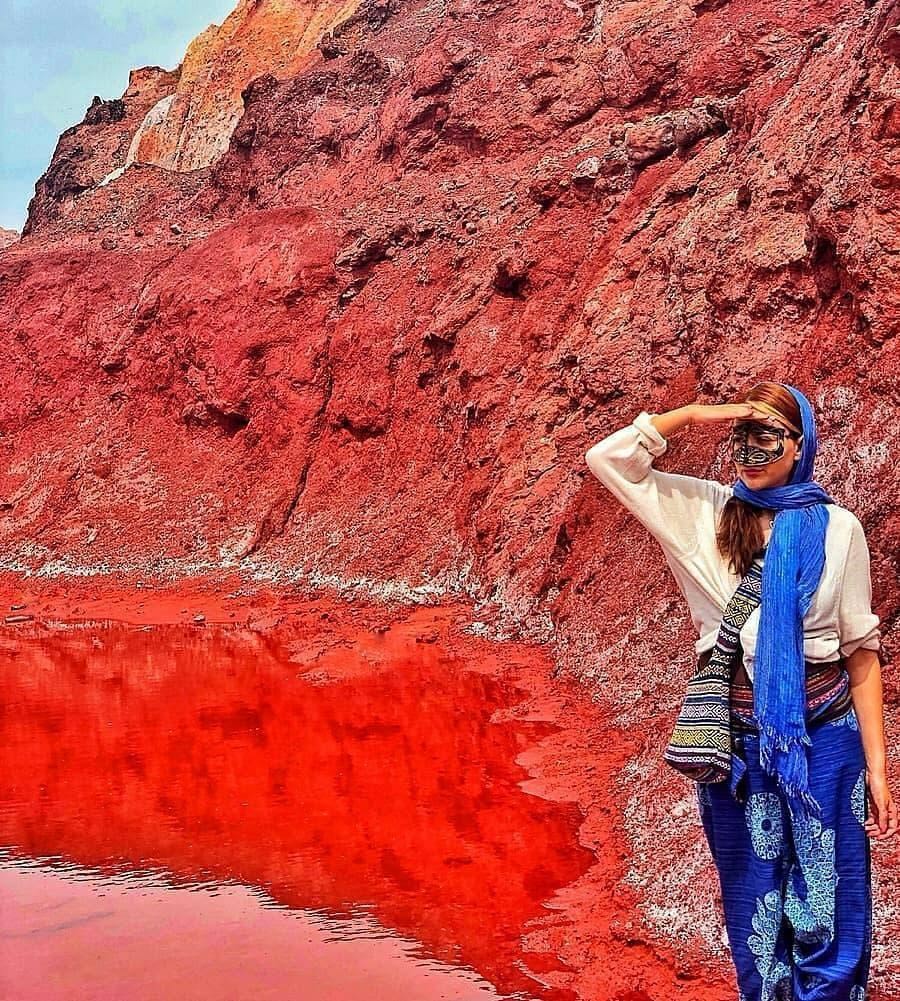KISH ISLAND
The warm seasons are approaching and island resorts will be on top of everyone’s radar. Kish Island, located in the Persian Gulf close to Qeshm Island, is Iran’s most popular island resort and the fourth most popular tourist destination in southwest Asia. Kish tourism owes this popularity to a few factors. Kish, alongside Qeshm, is a free-trade zone. This means tourists are not required to have any visa when coming to Kish, as long as they are not going to stay more than 14 days. It also means that almost all goods are cheaper to buy in Kish compared to other non-free-trade zones. What really makes this island “the pearl of Persian Gulf” and a wildly popular tourist destination, however, are its numerous attractions and recreational facilities.
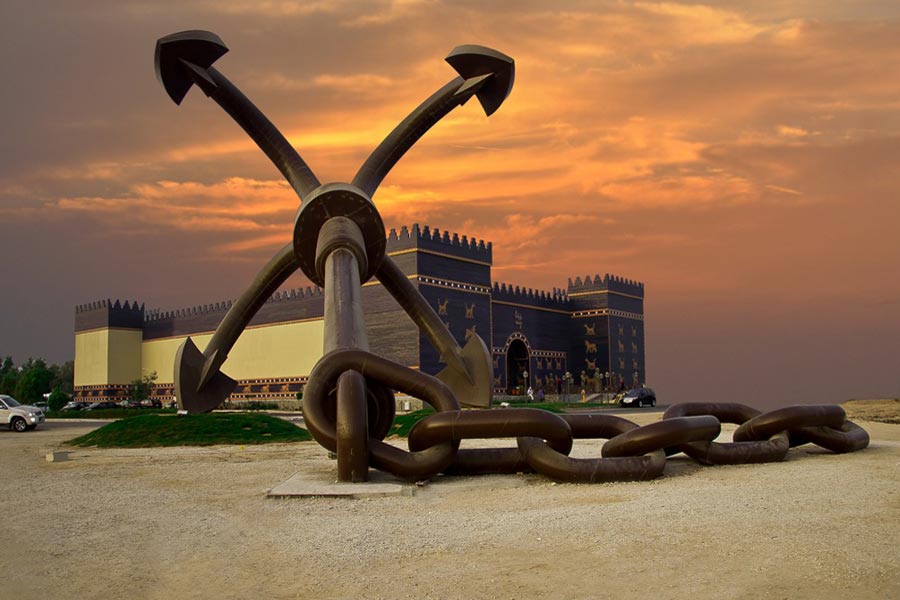
Dolphin Park
The Kish Dolphin Park is a 100-hectare massive entertainment park located in the southeastern part of Kish Island. It hosts over 20 types of sea mammals, including dolphins, sea lions, catfish, walruses, and penguins. There are buses inside the facility which you can take to visit the different parts of the park, including the dolphinarium, the bird park, and the different pools which host different sea mammals. If you like animals, you should certainly give this place a visit.
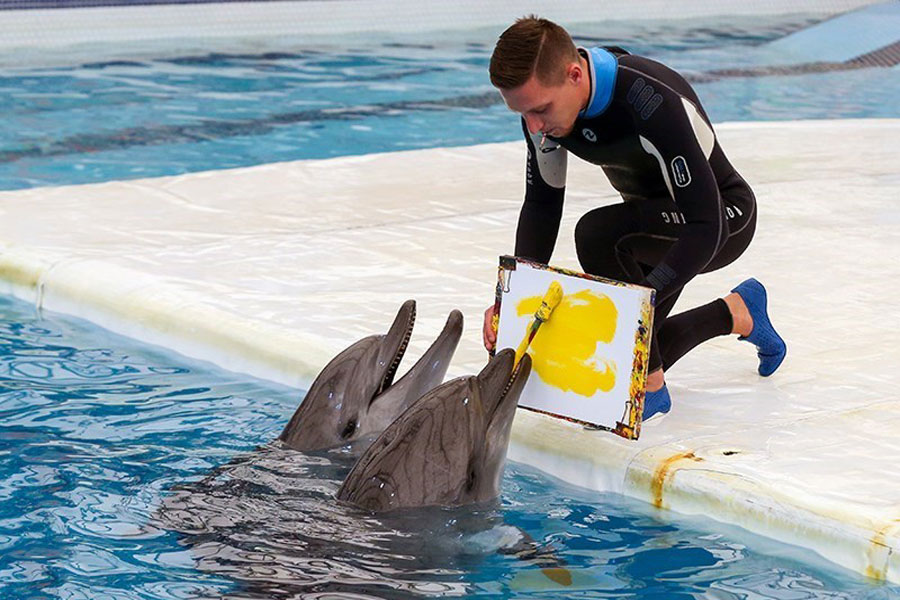
The Greek Ship
The Greek Ship is a 75-year-old cargo ship that has been beached in the western part of Kish Island since 1966. It has become a major Kish tourist attraction in recent years, where hundreds of people gather on the beach to watch the beautiful view of the sunset in the evening.here is a wide range of facilities in the Greek Ship beach, including Iranian and Lebanese restaurants, coffee shops, and bike rentals. If you like picture-perfect scenes, picnics and socializing with the Iranian people in a very peaceful environment, the Greek Ship will surely be a memorable experience for you
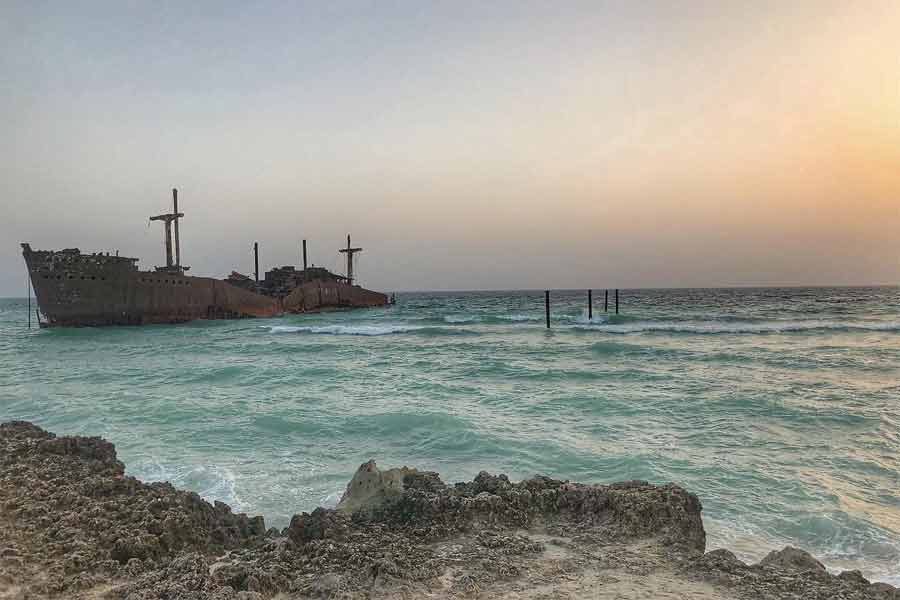
Ocean Theme Park
The Ocean Water Park is the first themed water park in Iran that was opened in January 2017. This outdoor park is themed around the story of the Mystery of the Sun Castle. The theme park employs over 400 staff and contains 13 rides, four swimming pools and one spa in addition to two restaurants, four beverage stops and coffee shops and two shopping areas. In the first six months after its opening, the Ocean Water Park set new records in Kish Iran tourism by attracting over 80 thousand tourists
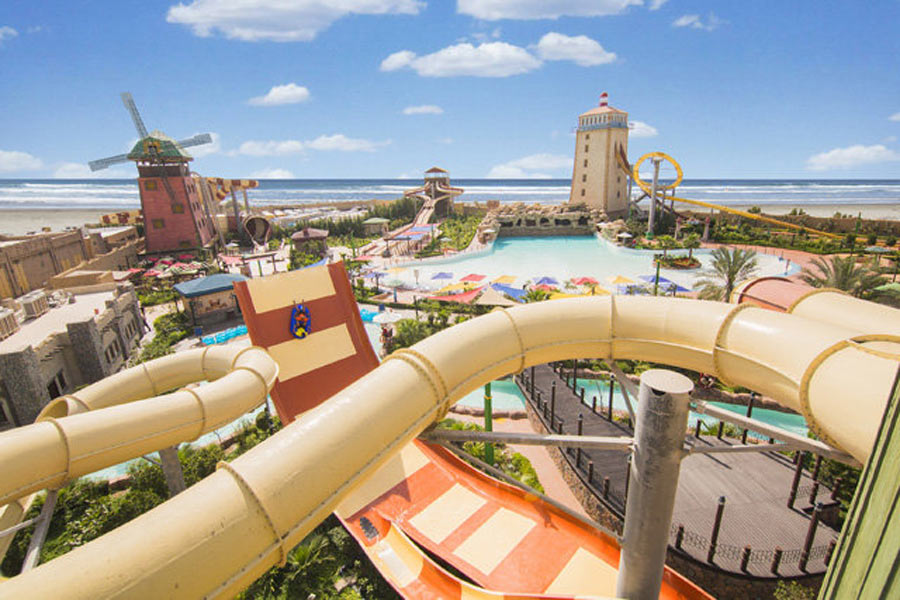
Kariz Underground City
Not many people travel to Kish for its historical attractions, so it surprises them to know that Kish has one of the oldest underground cities in Iran. The Kariz Underground City, Kariz literally meaning Qanat or aqueduct, was build over 2000 years ago by the inhabitants of the Harriyeh city in order to collect pure water. Once inside, take note of the coral ceiling which holds ancient fossils of fish and shells that are said by locals to be from millions of years ago. It is also interesting to know that Kariz has a steady cool temperature in all seasons, never going above or below 22-25 Celsius
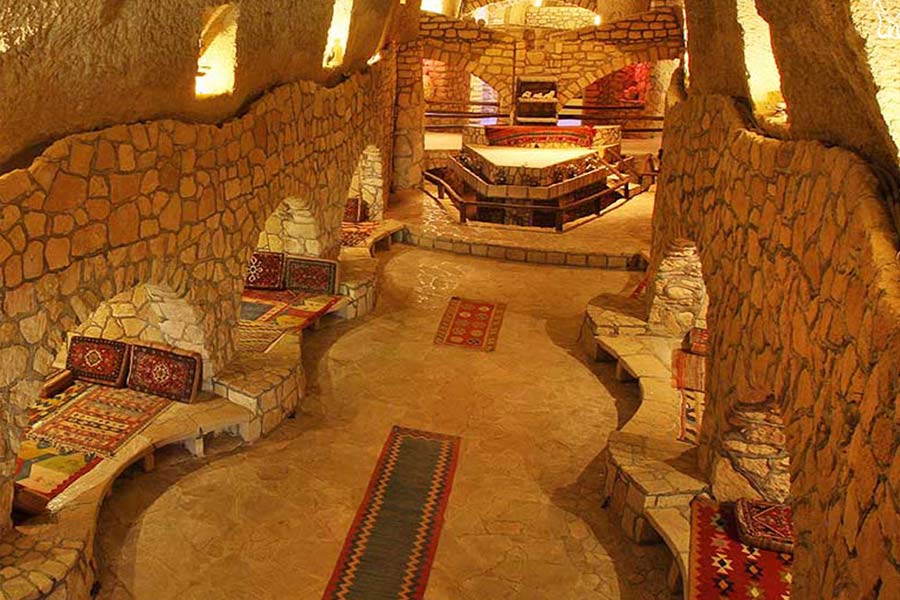
Ladies’ Beach
Paying even a small fee for using something like the beach might seem unnatural. The Kish Ladies’ beach, however, is one of the best of its kind in the middle east. This preserved women-only area provides one of the cleanest areas in Iran for women to swim and relax on the beach. Upon entering, you can leave your stuff in a locker, which you can recover later on your way back. There are also multiple showers to use after you are done. Overall, this is one of the best women-only beach facilities in the middle east
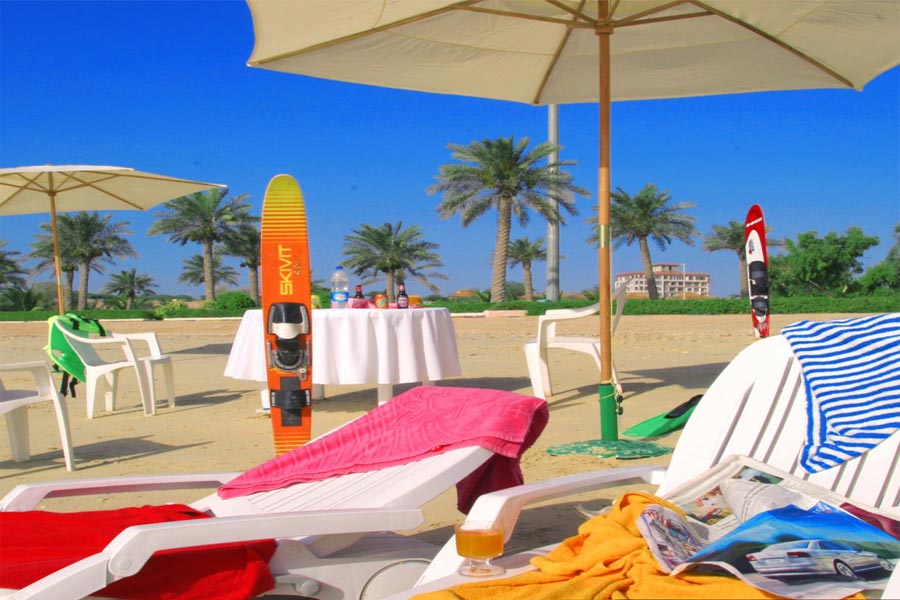
Jet Ski and Scuba Diving
Crystal clear waters of the Persian Gulf would be the best place to chill down and float in mesmerizing blue. One of the unique attractions of Kish is its various water sports and entertainments. Peaceful waters make the conduction of many sports such as Jet-ski and scuba diving. People who desire to take control of the sea a little for themselves should try these sports, as it cannot be experienced anywhere else
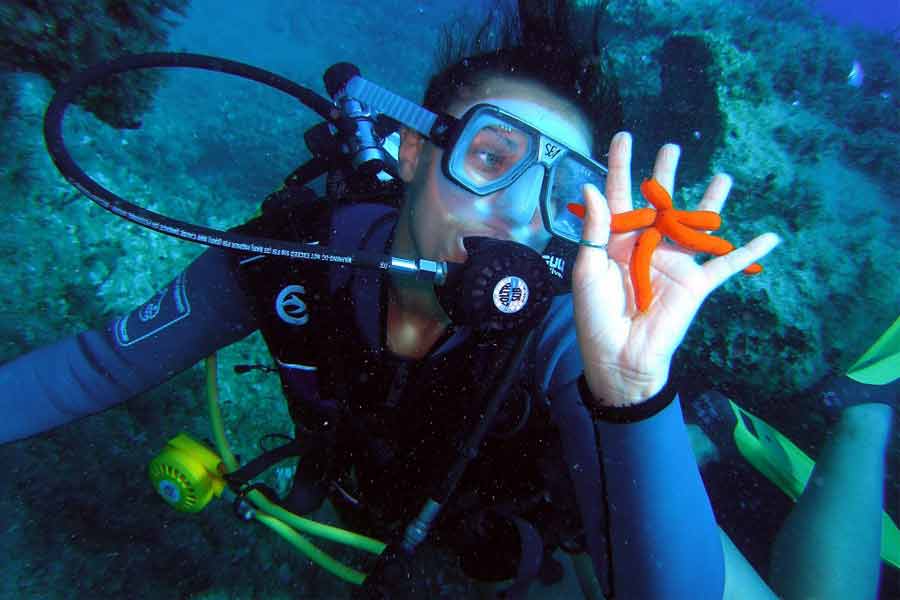
Harireh Ancient City
The ruins of the ancient town of Harireh, situated in the center of Kish Island, are said to be 800 years old. The ruins include the remains of a mansion with Ilkhanid era (1256-1353) tiles, a public bath, and industrial workshops. Archeologists believe that the multi-floored monuments of the town were destroyed in an earthquake. Referred to in the book of poems of Persian poet Sa'adi, the ruins of Harireh bear witness to the flourishing economy of Kish in ancient times when the island facilitated trade between China, North Africa, and Europe
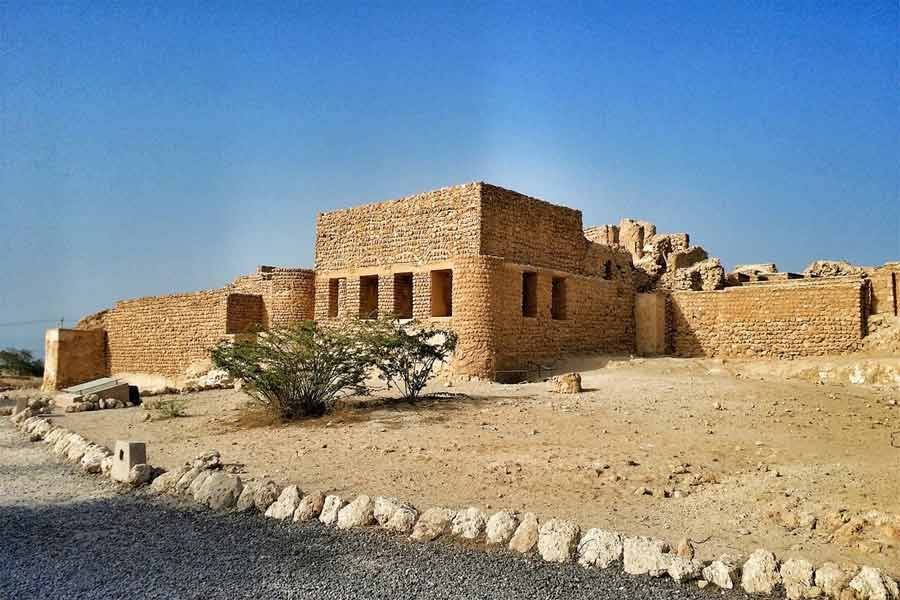
QESHM ISLAND
The biggest island of Persian Gulf
Qeshm is located in the east of Qeshm island with a height of 6 m above the sea level limited to Bandar Abbas, the central part of Khamir and some parts of Lenge port from the north, Hormoz island from the northeast, the Lark island from the east and the Hengam island from the south and Greater and Lesser Tunbs and Abu Musa from the southwest. Qeshm is located in the warm and arid lands with high relative humidity. Qeshm consists of 3 parts named ”Shahab“, ”Markazi”, ”Hormoz”, 4 cities and 7 rural districts. Qeshm is the second biggest island of Persian Gulf after Bahrain and the biggest independent island in the world with an appropriate strategic location. Qeshm significant strategic location as the main center of the commercial-industrial development in the free zone is related to the prosperous market, importing the important goods from the neighbor countries of the Persian Gulf, dedicated and special ports for services to merchants, fishermen's ships and tourism services
.jpg)
More about Qeshm Island
Qeshm Island has the most coasts in comparison with the other Persian Gulf islands. Rockey, sand and mud shores and mangrove forest present the Qeshm coastal diversity including the turtles, dolphins and other species of the animal’s habitat. There is the only crocodile breeding farm in this beautiful island. People of Qeshm speak in Farsi with the original Bandari dialect. The local language of Qeshm is a combination of Arabic, Farsi, Bandari, Hindi, and English. The residents of Qeshm are Muslims and most are the followers of Sunni (Shafei) religion. Qeshm Island in Iran is very popular with local tourists as it is a duty-free zone but it's amazing geological, natural and cultural sights are making it more and more popular with international tourists. Located in the Persian Gulf, visitors can reach Qeshm by ferry or flight. One entire half of the island has been named a UNESCO WORLD HERITAGE SITE and offers some amazing natural wonders. Qeshm Island is also home to some interesting traditional culture that you won't find in the rest of Iran. If you're looking for a relaxed, interesting and beautiful place to add to your Iran itinerary then Qeshm Island is it
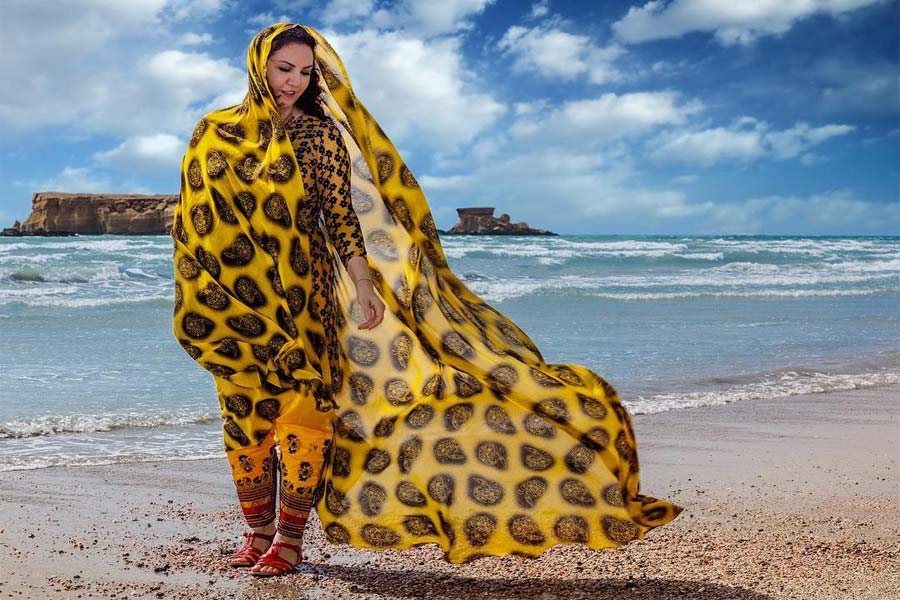
Why Qeshm Island is unique?
There are a few reasons for this popularity. Qeshm, alongside Kish, is a free-trade zone. What this means is that tourists are not required to present any visa when entering Qeshm (if they want to stay up to 14 days). Additionally, because it is a duty-free zone, all goods are considerably cheaper in Qeshm compared to the rest of Iran. Another reason for Qeshm’s popularity is its raw, pristine nature. Qeshm is a designated UNESCO GLOBAL GEOPARK , and it has numerous natural heritages that are under the protection of UNESCO. If you are tired of metropolises or want to get away from the bustling life of the modern-day, Qeshm is the perfect getaway for you
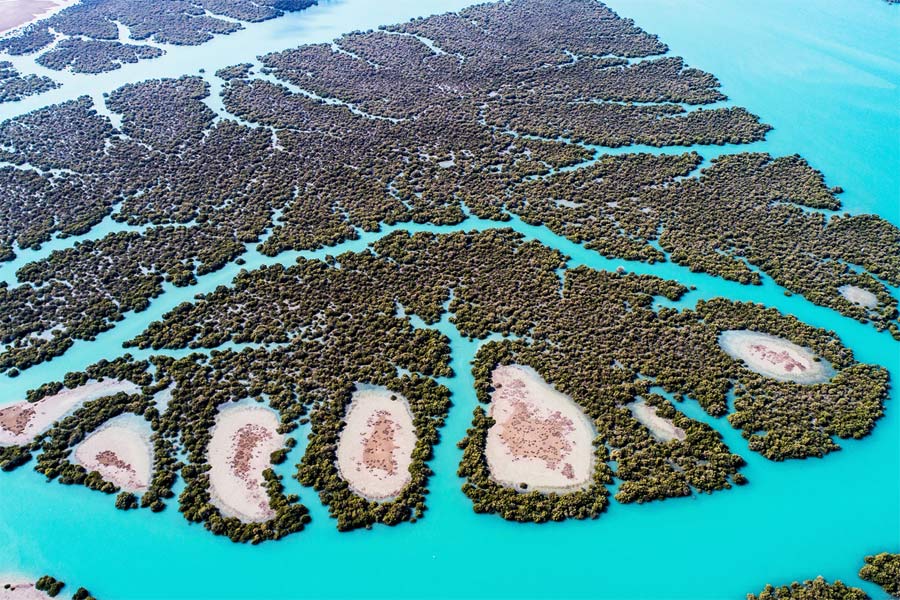
Natural Attractions
The natural attractions in Qeshm are fresh, untouched, and unparalleled
The Hara Marine Forests
The Hara Mangrove Forest is a restricted biosphere located in the Northwest of Qeshm. The hard forests are said to host about 1.5% of the world’s migratory birds in the cold seasons. If you get lucky, you can watch herons, pelicans, flamingos, and countless other rare birds on your trip to Hara Forests. Hara Forests is one of the most amazing natural attractions in Iran, absorb many domestic and foreign tourists every year. In the vicinity of Qeshm Island, Bandar Khamir and Hormoz Island, there is a collection of green Hara trees in the valley, with its streams, beautiful birds and its magnificent wildlife is one of the tourist attractions of the province of Hormozgan. Hara is the name of a tree in the size of 3 to 6 meters with green and bright leaves in the saltwater, and its scientific name (Avicennia Marina), attributed to Iranian scientist Abu Ali Sin. Hara plants have been emerged since the Eocene and Oligocene ages, about 30 to 40 million years ago. Hara’s grain grows on the mother tree and produces sapling. Then it separates from the tree and falls into the swamp. Hara forest is located in the sea and in the salt water, and this compromise with saltwater and inappropriate conditions makes it an exceptional plant. Hara trees are located in shallow parts of Khorkhoran Kenar and on the hills similar to an isle, which come out of the water completely when the sea level goes down. The depth of water in these areas does not exceed 1 to 1.5 meters

The Valley of Stars
Pack your camera and turn on the artistic side of your brain: The Valley of Stars is going to blow you off your feet. This surreal stone valley is one of the most beautiful, untouched natural attractions of Qeshm. It is said, according to locals, that the unusual stone shapes of this valley were created one starlit night when one of the stars fell off and collapsed onto the ground. The Valley of Stars is the perfect place to take walks in the daylight and capture beautiful photos. It is, unfortunately, closed at nights to visitors, which could all be for good reason because the locals believe that Jinns and ghosts roam the valley at night
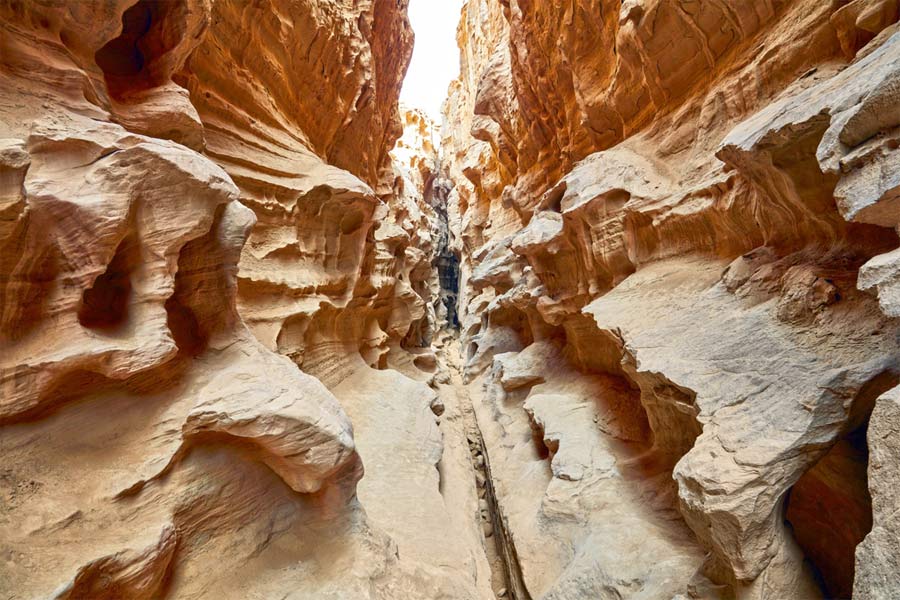
Namakdan Salt Cave
Namakdan is located about 100km from the mainland of Qeshm. It is the longest salt cave in the world. You will need a torch to be able to see inside the darkness of the cave. However, don’t worry if you don’t have one with you because they are sold at the site for a very low price. The journey inside will not be easy; you might need to crawl very close to the ground or walk-in uncomfortable positions. In the end, however, you will be rewarded with breathtakingly beautiful mixtures of colors and formations that will make the trip absolutely worth it. In order to improve your experience, it is advised to get a qualified guide to ease your way into this wonder of a cave
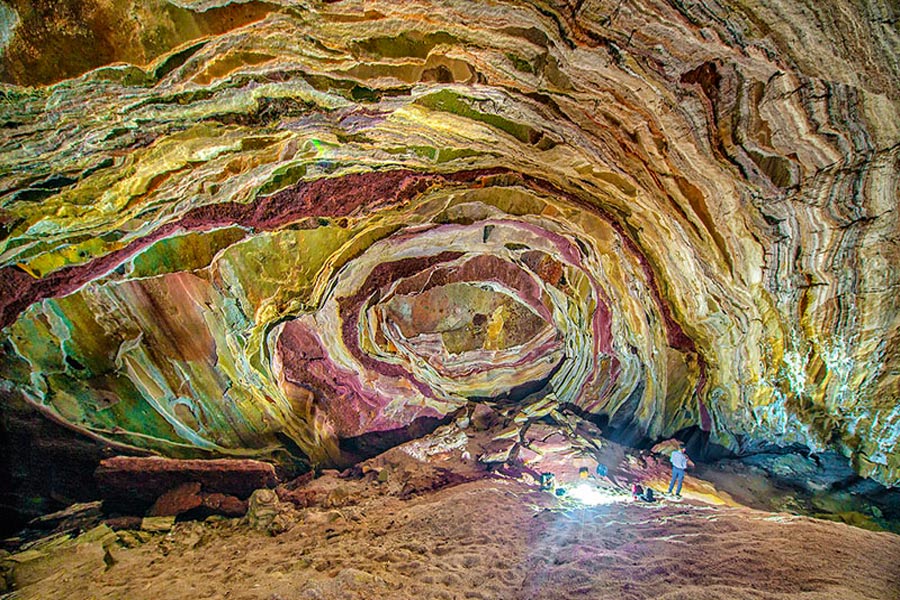
Chahkooh Canyon
Many consider the Chahkooh Canyon to be the first and most important of Qeshm’s ‘Seven Wonders’. The Chahkooh Canyon, or Chahkooh Valley is located in the Chahu-ye Sharqi village about 70 Kilometers off Qeshm. The Canyon goes about 100 meters deep into the ground. On your journey down, you can see a wide range of sedimentary rocks and their erosion in magnificent shapes on the walls and in cavities. If you enjoy hiking on rocks, and ethereal shapes, the Charkooh Canyon is bound to be a memorable experience
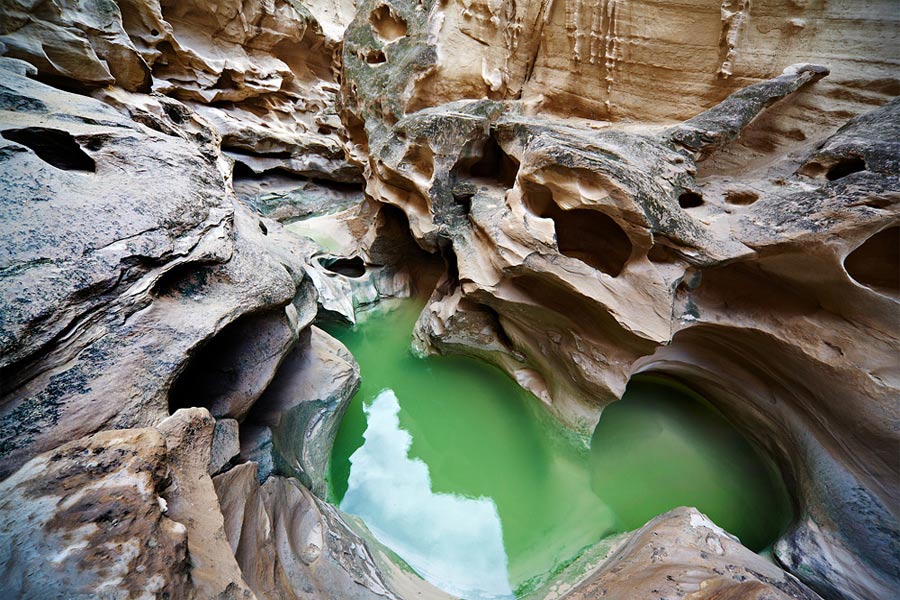
The Portuguese Castle
The Portuguese Castle in Qeshm is a remnant of Portugal's colonial rule in the Persian Gulf. The thick walls of this red stone castle were built over 500 years ago to safeguard Portuguese soldiers from potential local riots. This red stone fortress has recently become a popular destination with domestic and international tourists. It’s the history and the architecture of the castle that draws thousands of people to it every year. Among the few other Portuguese castles spread out in Persian Gulf islands, the one in Qeshm remains the most popular
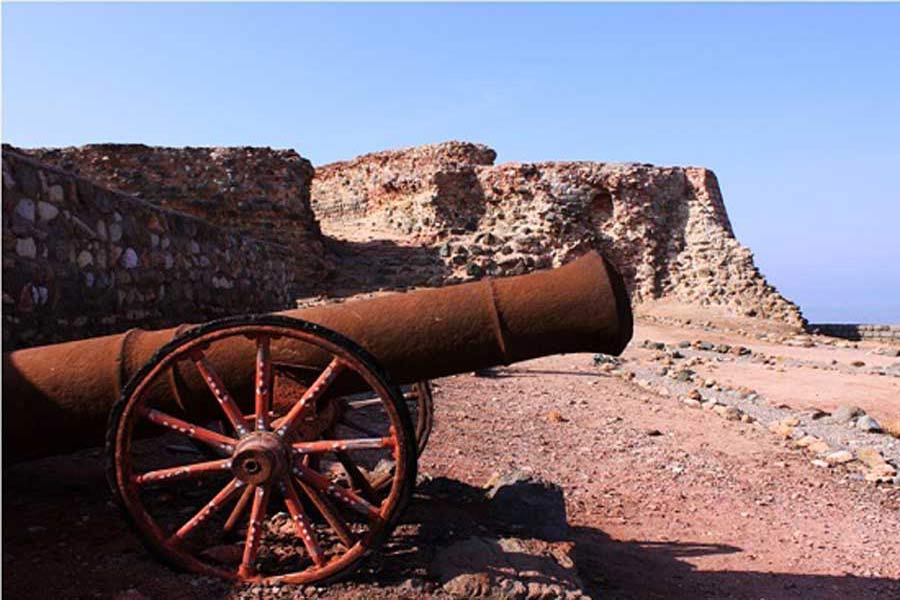
Getting from Qeshm to Hormuz Island
The ferry from Qeshm to Hormuz goes at 7am and 2pm daily and take around 50 minutes. It costs 90,000 IRR .There is also a ferry back from Hormuz at 3pm so it’s possible to visit Hormuz as a day trip. We recommend staying at least one night though to properly see the island. If you want more information check out our guide
HORMOZ ISLAND
AN ISLAND WITH EDIBLE SOIL IN IRAN
Have you ever heard of the edible mountain?
A strange mountain whose soil is used as a kind of spice by the locals! This edible mountain, which is the only edible mountain of the world, is located in Hormuz Island, Iran. Located in the Persian Gulf, Hormuz is the island of colorful beaches and many people refer to it as the Rainbow Island. The island is a center of geological studies. The people of Hormuz have their own special way of cooking. They take the fresh fish of their waters, such as sardines, kilka and another kind called ‘momagh’, clean them and marinate them in the peel of sour oranges and this particular sauce in a large container and leave it in the sun for two days. Then it's cooked to become a delicious meal called ‘suragh’. Its appetizing taste and color are very popular among tourists from both Iran and abroad. Very few visitors to this island leave without having tasted the dish.
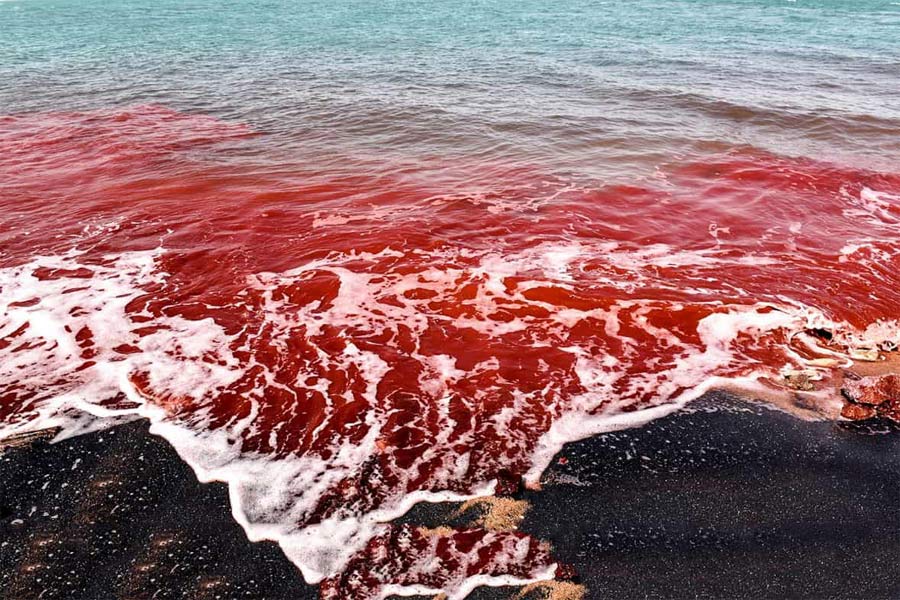
The same red soil is also used in baking the local bread called ‘tomshi’. The same bread is cooked in neighboring islands with cheese or dabbled with eggs; but Hormuz has its own special recipe made with ‘suragh’ which is rather popular. Guelak and suragh are also known in other parts of Hormuzgan Province and are used in foods such as ‘kalleh jush’ made with walnuts and whey, lentil rice, and small shrimps and other seafood. The wide-ranging colors of the soil include white, yellow, red, green, orange, beige, brown, light turquoise, and even gold. From a geology perspective, the island is one of the most important salt domes of the world; due to these features, it is given the name lithology lab. The agile artists of the island also produce hand arts such as colorful paintings made with their valuable soil, also very popular among tourists. Nevertheless, the exploitation of the island’s soil has created environmental concerns for some years now, which is why the Environmental Protection Agency is seeking to protect and stop its use

History of Hormuz Island
Hormoz Island (Hurmoz) lies like an oyster shell amidst the waters of the Persian Gulf, covering an area of 41.9 sq. km. Hormoz Island is located to the southeast of Bandar Abbas and lies within 10 nautical miles from it. The island, known as Organa to the ancient Greeks and as Jarun in the Islamic period, acquired the name of "Hormuz" from the important harbor town of Hormuz (Ormus) on the mainland 60 km away, which had been a center of a minor principality on both sides of the strait. The island is arid, and during the summer months, the temperature can rise to over 43 °C (109 °F). Hormuz is an island full of wonders. The land of colored soils. undefined Where the redness of its soil and the sea become together. A strange mountain whose soil is used as a kind of spice by the locals! This edible mountain, which is the only edible mountain of the world, is located in Hormuz Island, Iran. Hormuz is an old island. The sources say this island is 600 million years old. The same sources say that Hormuz island had a brutal trade before the Mongols attack. When the Mongols came, they took their homes and villages. Some people moved to Qeshm, and others moved to Gambaron pier and built a city that they named it Hormuz because of the name of that ancient city
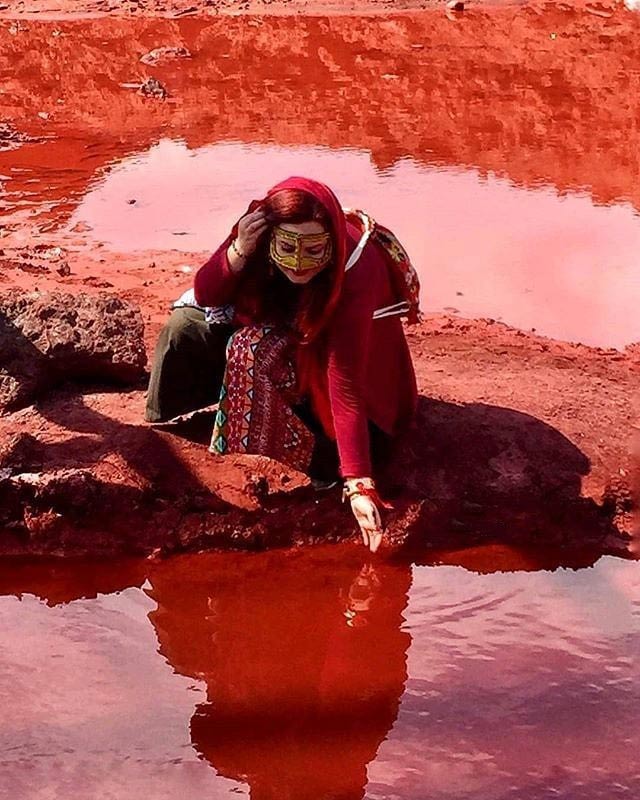
The wide-ranging colors of the soil include white, yellow, red, green, orange, beige, brown, light turquoise, and even gold. From a geology perspective, the island is one of the most important salt domes of the world; due to these features, it is given the name lithology lab. The agile artists of the island also produce hand arts such as colorful paintings made with their valuable soil, also very popular among tourists. Undefined The best time to visit Hormuz island is winter. Natural events like the migration of birds and turtles also occur in this season. Undefined When you decide to travel to the Hormuz island, you need to prepare yourself, because in Hormuz there is neither a shopping center or a luxurious hotel. Everything is pristine and intact, and actually, this is what makes this island unique that there are no urban elements there
